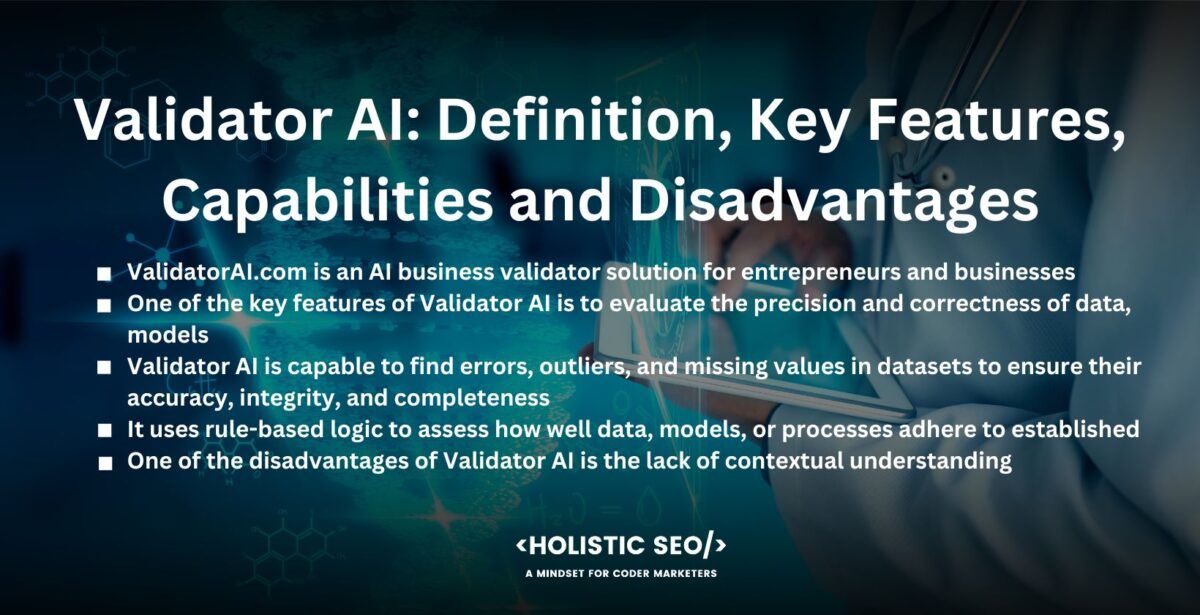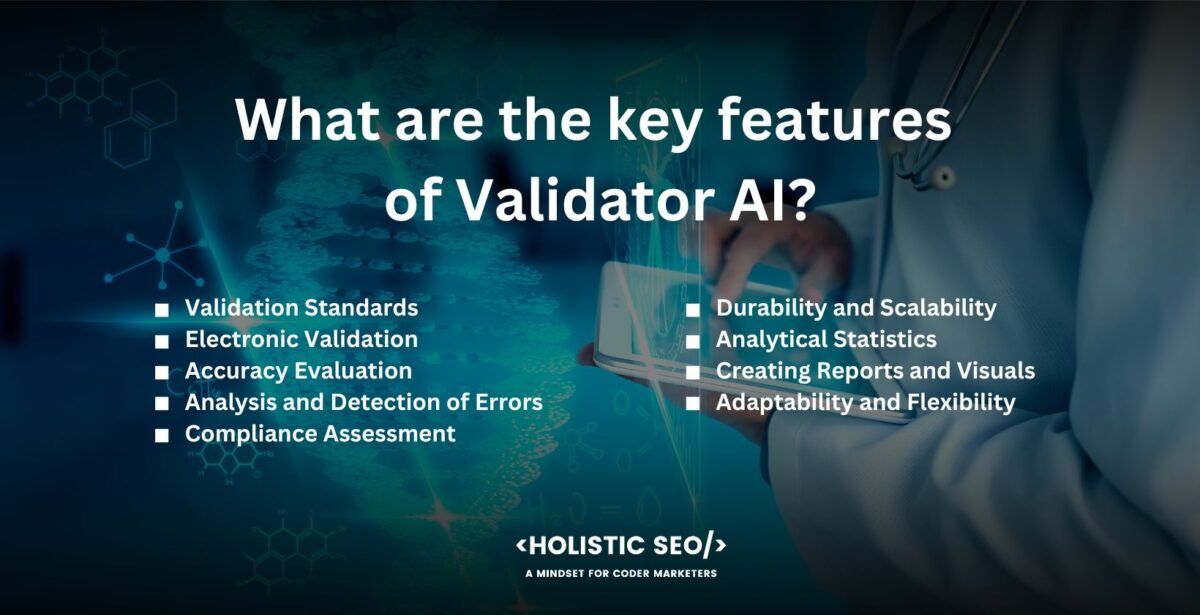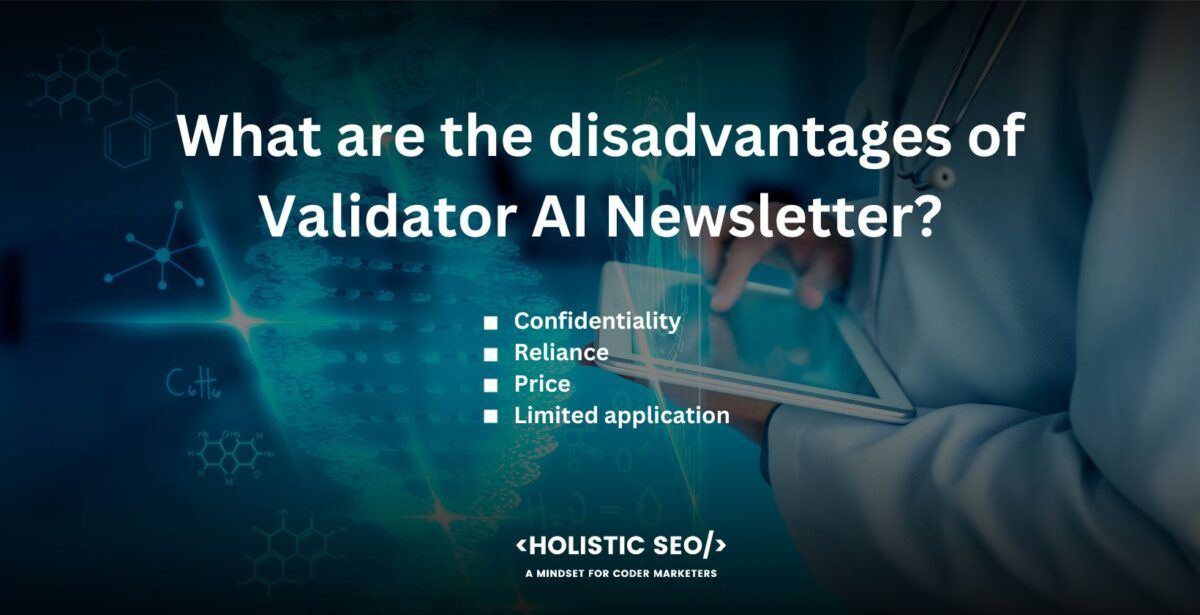A “Validator AI” is an artificial intelligence system or component that is intended to validate or verify specific features of data, models, or procedures. ValidatorAI.com is an AI business validator solution for entrepreneurs and businesses. It uses artificial intelligence to deliver impartial evaluation and constructive criticism of any business proposal. The website validator allows startup ideas of entrepreneurs to enter their concepts and obtain automatic feedback.
One of the key features of Validator AI is to evaluate the precision and correctness of data, models, or procedures using predetermined standards or benchmarks. Second, it works by comparing the intended data, models, or procedures to predetermined guidelines, specifications, or standards. Third, the Validator AI website reduces the need for manual inspection and enables effective and reliable review by automating the validation process.
Fourth, it is appropriate for applications that require lengthy validation, since it handles vast amounts of data or complicated models. Lastly, the validator websites search for errors, anomalies, or inconsistencies in the data or models to assure the accuracy and dependability of the validated elements.
Validator AI is capable to find errors, outliers, and missing values in datasets to ensure their accuracy, integrity, and completeness. It evaluates machine learning models’ functionality, strength, equality, and compliance to make sure they adhere to predetermined standards or benchmarks.
Validator AI lowers the risk of non-compliance by determining whether systems or procedures comply with particular rules, specifications, or compliance requirements. It uses rule-based logic to assess how well data, models, or processes adhere to established norms or rules. Validator AI uses statistical approaches to examine and validate the data, models, or processes. It provides insights and identifies patterns or deviations.
One of the disadvantages of Validator AI is the lack of contextual understanding. Validator AI relies entirely on predetermined criteria or rules, without considering the subtle elements or domain-specific knowledge. Another disadvantage is its efficacy depends on how current and precise the predetermined validation criteria or benchmarks are, they need to be updated frequently.
The next disadvantage is the difficulty to train validator AI systems in some domains or for particular activities, since they need large amounts of labeled or validated data. Lastly, the Validator AI newsletter occasionally classifies data or models inaccurately, producing false positives or false negatives, which affect the validity of the validation process.

What is Validator AI Newsletter?
The Validator AI newsletter allows entrepreneurs to enter their concepts and obtain automatic feedback. The comments are based on market prospects, legal concerns, and clients. Validator AI newsletter provides articles, rapid startup assistance, and access to a community of 33384 users to assist entrepreneurs in moving forward with their ideas. The tool is made to assist entrepreneurs in validating their concepts and receiving in-depth feedback at the very beginning of their business, so they proceed with caution.
The Validator AI newsletter helps entrepreneurs save time and effort by highlighting potential blind spots in the business plan. Entrepreneurs sign up to receive notifications when new features and upgrades are available because the product is being enhanced and upgraded.
When did Validator AI started?
There is no information on when Validator AI was developed. It was created by Aron Meystedt, an established entrepreneur and alternative assets’ businessman, to assist young business owners in advancing their concepts.
How does Validator AI work in delivering the latest developments in AI?
Diverse mechanisms are utilized by a validator AI focused on bringing the most recent advancements in AI to acquire, validate, and provide data. Firstly, it uses natural language processing (NLP) techniques to scan and examine a variety of sources, such as research papers, articles, conference proceedings, and business reports, to find the most recent developments in the field of AI.
Secondly, the Validator AI evaluates the accuracy, importance, and dependability of the discovered developments using a combination of automatic validation techniques and human expertise. It includes validating the sources, reviewing the research methodology, and cross-referencing findings with other credible sources to assure correctness.
Thirdly, the AI system uses personalized recommendation algorithms to give the latest developments in AI to specific consumers. The algorithms prioritize and filter relevant material based on users’ preferences, interests, and previous experiences with the system. The Validator AI makes use of natural language generation (NLG) techniques to simplify and express the developments in an approachable manner, allowing users to rapidly understand the most important conclusions and ramifications.
The Validator AI newsletter utilizes machine learning models to monitor patterns and trends in the AI industry, enabling it to spot new trends, active research areas, or significant changes in the industry.
What are the key features of Validator AI?
Listed below are the key features of Validator AI.
- Validation Standards: Validator AI functions according to specified standards or criteria that are particular to the task or domain it is intended for. The standards form the foundation for assessing and validating data, models, or procedures.
- Electronic Validation: Validator AI simplifies and speeds up the review process, eliminating the need for manual inspection. It is appropriate for applications that call for lengthy validation, since it handles massive quantities of data or complicated models.
- Accuracy Evaluation: Validator AI evaluates the correctness and accuracy of the target data, models, or processes. It compares the elements being verified to the specified rules, standards, or requirements to find errors, abnormalities, or contradictions.
- Analysis and Detection of Errors: Validator AI is excellent at finding flaws, outliers, or inconsistencies in the data or models it examines. It evaluates and identifies the precise regions or components that fall short of the established validation standards.
- Compliance Assessment: Validator AI determines whether a system, procedure, or dataset complies with a given set of rules, specifications, or compliance requirements. It minimizes the chance of non-compliance by ensuring adherence to pertinent norms or protocols.
- Durability and Scalability: Validator AI is built to work with a wide range of data formats, model architectures, and system setups. It has scalability and resilience, which allow it to validate various data kinds and scales, models, or processes.
- Analytical Statistics: Validator AI analyzes and validates data, models, and processes using statistical methods and procedures. It undertakes statistical analysis to find patterns, correlations, or deviations that affect the validation result.
- Creating Reports and Visuals: The validation results are summarized in reports or visualizations created by the validator AI, giving users insights and useful knowledge. The comprehension and usefulness of the validation results are improved by the feature.
- Adaptability and Flexibility: AI systems for validators are frequently created to be versatile and flexible. They enable customization depending on particular requirements or changing standards since they handle changes in validation criteria, rules, or requirements.

What are the capabilities of Validator AI?
Listed below are the capabilities of Validator AI.
- Validation of Data: Validator AI examines and verifies the accuracy, precision, completeness, and integrity of datasets. It examines the data for flaws, anomalies, missing values, or outliers.
- Model verification: Validator AI is capable of assessing the fairness, accuracy, performance, and robustness of machine learning models. It evaluates if the models adhere to established standards, benchmarks, or legal requirements.
- Confirmation of Compliance: Validator AI checks if systems, processes, or data comply with particular rules, specifications, or compliance requirements. It guarantees that the verified components adhere to pertinent rules or procedures.
- Error Analysis and Detection: Validator AI is excellent at finding flaws, inconsistencies, abnormalities, and outliers in the data or models it is validating. It evaluates and identifies the precise regions or components that fall short of the established validation standards.
- Validation Based on Rules: Validator AI uses rule-based logic to check data, models, or processes against established rules, standards, or specifications. It looks for consistency, adherence, or compliance with rules that have been set forth.
- Analysis Using Statistics: Validator AI analyzes data, models, or processes using statistical methods and techniques. It does statistical analysis to find patterns, correlations, deviations, or trends, giving details on the outcomes of the validation.
- Scalability and Effectiveness: Validator AI is built to effectively handle massive amounts of data or sophisticated models. It adapts its validation capabilities to fit elements of different sizes and complexities.
- Interpretation and Understanding: Validator AI offers understandable and intelligible capabilities to assist users in comprehending the validation procedure and the variables affecting the outcomes of the validation. It increases the validity of results’ transparency and trustworthiness.
- Electronic Validation: Validator AI simplifies and streamlines the review process, eliminating the need for manual inspection. It manages time-consuming or repetitive jobs, saving both time and effort.
- Personalization and Flexibility: Validator AI systems are frequently modified or adjusted to fit certain use cases or domains. It enables users to create their own validation criteria, rules, or requirements, allowing them to customize the validation process to their own needs.
Yes, Validator AI is considered to be one of the best AI newsletters. It was established by an established entrepreneur. Validator AI is free to use and gives any startup idea feedback and approval and AI-powered research of market prospects, legal issues, and potential clients. It uses the latest AI to deliver impartial evaluation and constructive criticism of any business proposal. There are other best AI newsletters available that fit an individual’s needs.
Does Validator AI provide an informative AI Newsletter?
Yes, Validator AI gives an informative AI newsletter. The tool was created to assist and encourage aspiring entrepreneurs. It gives customized resources, such as guidance and connections to successful businesses and investors. The company’s idea allows entrepreneurs to enter their concepts and obtain automatic feedback.
How does Validator AI help in delivering traffic to a website through AI Newsletter?
Validator AI employs AI algorithms to gather important and excellent information from multiple sources about the specialty or target market of the website. The Validator AI newsletter draws readers who are interested in the covered themes by choosing informative and interesting articles, research papers, or insights. The content of the newsletter is tailored depending on user preferences and interests using machine learning methods.
The AI system suggests particular articles or sections of the newsletter that are more inclined to connect with each subscriber by examining user behavior, interaction patterns, and feedback. A tailored strategy improves the chance of bringing in and keeping readers. Validator AI examines patterns and trends within the AI field to pinpoint hot subjects, fresh research, or popular debates. It presents the website as a trustworthy source of the most recent developments in AI by integrating such insights in the newsletter and supplying users with useful and current information.
Readers who are actively looking for cutting-edge insights are drawn to it. Validator AI includes interactive features in the newsletter, such as tests, polls, or surveys, to increase reader engagement. It boosts user interaction and inspires curiosity by giving an interactive experience, motivating readers to visit the website for more interactive material or to access more resources.
Deep links or call-to-action buttons that point readers to particular web pages or articles are deliberately inserted into the newsletter using Validator AI. The method promotes additional exploration and directs visitors to the desired websites. Search engine optimization for the newsletter content is helped by Validator AI. The AI system makes sure that the newsletter is search engine friendly by applying AI-driven techniques, such as natural language processing, keyword analysis, and content optimization, which improves the website’s exposure in search results and generates organic traffic.
Can Validator AI Newsletter be used in Machine Learning for data validation?
Yes, the Validator AI newsletter is a useful tool for data validation using machine learning. The newsletter offers information, essays, and research papers on a variety of subjects about data validation in machine learning. Computers are taught to learn from experience using a method called machine learning. Data scientists enhance the dependability and accuracy of their training datasets by using guidance on data quality evaluation, preparation methods, and outlier detection strategies. The newsletter examines different validation methods, such as holdout and cross-validation, and offers explanations, case examples, and helpful advice for successfully putting the techniques into practice.
What are the disadvantages of Validator AI Newsletter?
Listed below are the disadvantages of the Validator AI newsletter.
- Confidentiality: Security and privacy of data are issues when using any third-party service, especially when validating sensitive or private information. It is essential to carefully check the platform’s privacy policy and data management procedures before using the service.
- Reliance: Users depend on Validator AI for their data validation requirements, there is a danger if the service is interrupted or has downtime.
- Price: The subscription is free, but the service is not. Small organizations and individual users find the price levels unaffordable.
- Limited application: It is not appropriate for applications involving more complex data processing because Validator AI is primarily concerned with data validation.

How to subscribe to Validator AI AI Newsletter?
There are steps on how to subscribe to the Validator AI newsletter. Firstly, go to the URL https://validatorai.com/ by using any browser. Make sure to locate the official website before subscribing. Secondly, hit the “Sign-up” button at the upper right side of their homepage and enter an active email address. Registration is free and gets access to their services.
Pay a $10 per month fee for special services, such as The Favourites Discover tool, the Submit Community tool, and the AI Business Validator tool. The Favourites Discover tool allows subscribers to browse 41 AI startup tools for ideas that were trained by 1.5M+ people who liked or disliked them. The Submit Community tool gives subscribers the chance to get helpful criticism to validate and enhance their startup idea. The AI Business Validator tool offers a general evaluation of the company idea, a list of probable difficulties they experience running the firm, and AI-powered feedback.
How often does Validator AI deliver AI Newsletter?
It did not mention how often Validator AI delivers newsletters, unlike other newsletters that issue every week. Some newsletters have daily and monthly issues. People are free to access the website anytime as long as they are registered. Users get a report with comments on the concept’s sustainability, logistics, and any issues that they have not been aware of. The subscription is free, but there are additional services that cost them a $10 monthly fee.
Is Validator AI Newsletter free?
Yes, the Validator AI newsletter is a free service, but it requires registration. There are other services of Validator AI that costs $10 per month. The services offered are The Favourites Discover tool, the Submit Community tool, and the AI Business Validator tool. Subscribers have the option to cater additional services. They are free to cancel their subscription if they don’t need it.
Validator AI specializes in offering in-depth insights and knowledge on advanced data validation approaches unique to AI and machine learning. It investigates cutting-edge techniques, formulas, and guidelines for evaluating AI models and datasets, providing distinctive and specialized knowledge in the field. Ethics and compliance in AI receive a lot of attention from validator AI. It addresses a wide range of subjects, including equality, transparency, bias detection, and privacy protection, assisting readers in navigating the difficult ethical areas of AI and assuring responsible AI development and implementation.
Validator AI distinguishes itself by offering exclusive research papers, case studies, and industry insights that highlight real-world uses of data validation in AI. It works with prominent researchers, practitioners, and organizations to create original content that highlights the practical application and impact of data validation in AI initiatives. A great degree of customization and personalization selections for subscribers are provided by Validator AI. It helps readers to personalize their mailing experience by focusing on specific AI subdomains, interest areas, or validation issues.
The relevancy and value of the content delivered to each individual reader are improved with that level of customization. Validator AI promotes an active community and collaboration platform, allowing subscribers to interact, share insights, and participate in conversations around data validation in the AI newsletter. A vibrant and engaging ecosystem is created by offering forums, webinars, or networking opportunities where readers communicate with subject-matter experts, pose questions, and share knowledge.
- 48 Online Shopping and Consumer Behavior Statistics, Facts and Trends - August 22, 2023
- B2B Marketing Statistics - August 22, 2023
- 38 Podcast Statistics, Facts, and Trends - August 22, 2023


